Term Page
Asylum Path Fragment
community 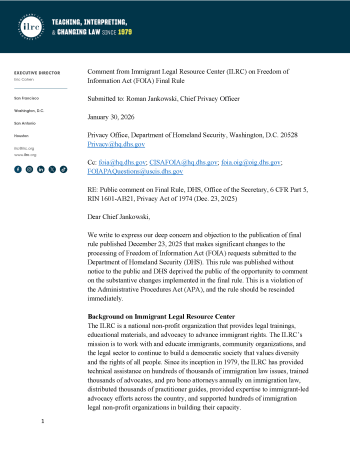
ILRC submitted this comment to DHS opposing recent changes to FOIA rules effective January 22, 2026 that restrict public access. DHS published a final rule in violation of the Administrative Procedures Act by unlawfully bypassing public notice and comment. The rule eliminates paper filing of FOIA requests and allows DHS in its discretion to administratively close requests that it deems to insufficiently describe the records sought.
The U.S. Department of Justice has issued a new rule that changes how immigration appeals are handled. The new rule shortens the time you have to appeal—which is how you ask for another court to review an unfavorable decision from an immigration judge.
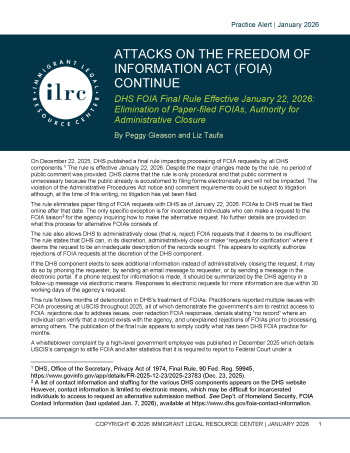
On December 22, 2025, DHS published a final rule impacting processing of FOIA requests by all DHS components. The rule is effective January 22, 2026. Despite the major changes made by the rule, no period of public comment was provided. The rule eliminates paper filing of FOIA requests with DHS as of January 22, 2026. FOIAs to DHS must be filed online after that date. The rule also states that DHS can, in its discretion, administratively close or make “requests for clarification” where it deems the request to be an inadequate description of the records sought.
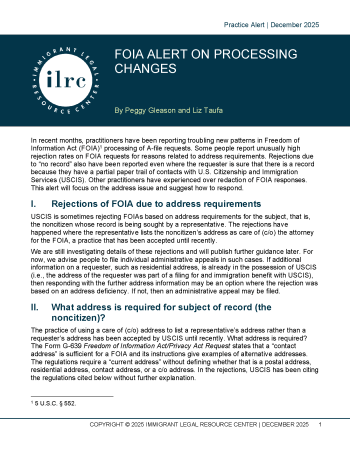
In recent months, practitioners have been reporting troubling new patterns in FOIA processing of A-file requests. Some people report unusually high rejection rates on Freedom of Information Act (FOIA) requests for reasons related to address requirements. Rejections due to “no record” also have been reported even where the requester is sure that there is a record because they have a partial paper trail of contacts with USCIS. Frequent over redaction of FOIA responses also has been reported. This alert discusses the address issue and suggests how to respond.
Information about these agreements and the rights of asylum seekers in immigration court proceedings if the government makes this argument in an immigration court hearing.
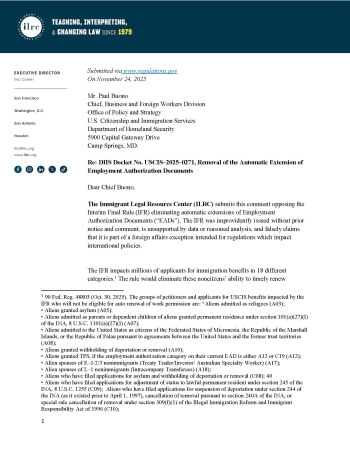
ILRC submitted this comment on November 25, 2025 opposing the Interim Final Rule (IFR) eliminating automatic extensions of Employment Authorization Documents (“EADs”). The IFR was improvidently issued without prior notice and comment, is unsupported by data or reasoned analysis, and falsely claims that it is part of a foreign affairs exception intended for regulations which impact international policies.
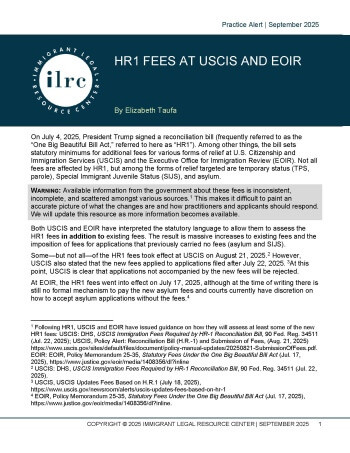
This practice advisory provides information about recently implemented fee increases at USCIS and EOIR. These fee increases are a result of the “One Big Beautiful Bill Act” also known as HR1. This advisory explores what we know and what we still don’t know about the fees, how to pay them, and potential future changes.
On July 28, 2025, the ILRC submitted a comment opposing a new government proposal to add extra questions to nine immigration forms, including applications for naturalization, asylum, and green cards.
On May 2, 2025 the ILRC submitted a letter signed by 115 organizations has opposing a U.S. Citizenship and Immigration Services (USCIS) proposed rule to expand the information collected on immigration forms.
On May 2, 2025 the ILRC submitted a comment opposing a proposed U.S. Citizenship and Immigration Services (USCIS) rule that would expand the collection of personal information from immigration applicants.